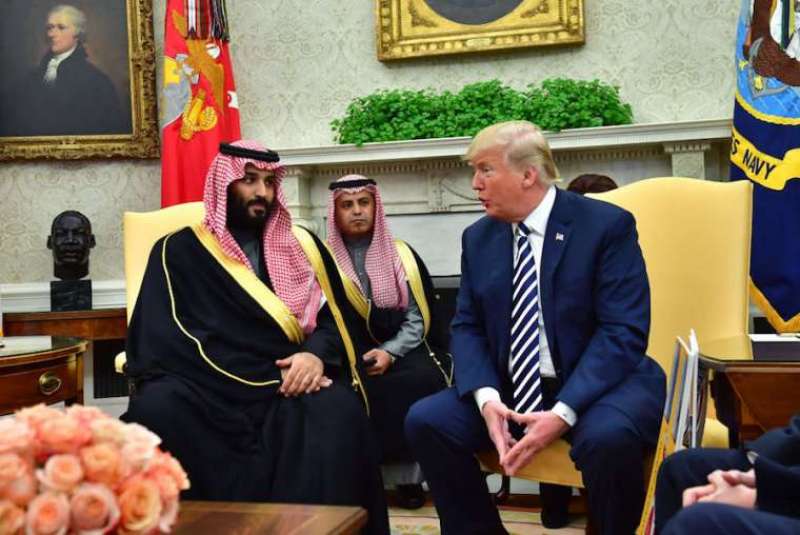The Senate on Monday failed to override President Trump’s veto of their attempts to block over $8 billion in arms transfers to Saudi Arabia and the United Arab Emirates.
“All evidence suggests that the Saudis have intentionally targeted hospitals, bridges, power stations, apartment buildings, weddings, schools and even a school bus filled with children, leaving thousands of Yemeni civilians killed or maimed,” Sen. Bob Menendez (D-N.J.) stated July 29 on the Senate floor.
“Over the years Congress has received many assurances about how U.S. arms sales, advice and assistance would supposedly help the Saudi Air Force and command authority better identify military targets and thereby reduce risk to civilians,” he said.
“Those assurances no longer stand. We cannot brand the sale of precision-guided munitions as ‘humanitarian’ weapons if the Saudis are intentionally targeting civilians in the first place.”
The sale of munitions and equipment, as part of the broader alliance of the two countries, was criticized because of Saudi Arabia’s widely-publicized human rights abuses. Critics of the arms deal have objected to the use of U.S.-supplied weapons and weapons systems in the ongoing civil war in Yemen between Iran-backed Houthi rebels and the Saudi Arabia-backed government.
The State Department in May used emergency authority under the Arms Control Export Act to approve the 22 arms transfers to Jordan, the UAE, and Saudi Arabia without congressional consent.
Secretary of State Mike Pompeo said that the transfers, totaling over $8 billion, were for the purposes of regional stability and support for U.S. allies in deterrence of “Iranian aggression.”
In June, the Senate passed resolutions of disapproval of the arms transfers in an attempt to block the move. Three of the resolutions, S.J.Res. 36, 37 and 38, were sponsored by Sen. Bob Menendez (D-N.J.) and passed by the Senate on June 20 and the House on July 17. They were vetoed by President Trump last Wednesday, who said that the resolutions would “damage the important relationships we share with our allies and partners.”
Trump also stated that “it is our solemn duty to protect the safety of the more than 80,000 United States citizens who reside in Saudi Arabia and who are imperiled by Houthi attacks from Yemen.”
On Monday, the Senate voted to override the vetoes on the three resolutions, failing to do so in votes of 45 to 40, 45 to 39, and 46 to 41, respectively. Five Republicans joined the vote to override the veto on S.J.Res. 36: Sens. Susan Collins (R-Maine), Jerry Moran (R-Kan.), Lisa Murkowski (R-Alaska), Mike Lee (R-Utah), and Todd Young (R-Ind.).
The State Department’s 2018 human rights report noted serious human rights abuses in Saudi Arabia including “unlawful killings; executions for nonviolent offenses; forced renditions; forced disappearances; and torture of prisoners and detainees by government agents.”
Additionally, the State Department cited reports of “arbitrary arrest and detention,” “political prisoners,” “trafficking in persons,” “violence and official discrimination against women,” and “criminalization of consensual same-sex sexual activity.”
The October killing of columnist Jamal Khashoggi by Saudi government agents inside the consulate of Saudi Arabia in Istanbul drew international outrage, yet while King Salman ordered an investigation, the State Department reported that the Public Prosecutor’s Office had not provided names of suspects nor an update on the investigation by the end of 2018.
Yemen’s civil war has been ongoing since 2015, and is considered the world’s largest humanitarian crisis with tens of thousands of civilians killed or injured, over three million displaced, 80 percent of the population in need of assistance and 10 million threatened by famine, according to the UNDP.
Pope Francis has repeatedly called for peace in Yemen, drawing attention to “the starving children of Yemen.”
Critics of the arms deal in the Senate have warned that it will contribute to the humanitarian crisis in the civil war.
“President Trump talks about our strategic relationship with Saudi Arabia as if all we care about is selling weapons, stabilizing energy markets, and having a close ally in a potential conflict with Iran,” Sen. Chris Coons (D-Del.) stated on Twitter on Monday.
He added that “the President has failed to hold Saudi Arabia accountable for its conduct in the war in Yemen, its human rights violations, & for the murder of American-resident journalist Jamal Khashoggi. Today the Senate has an opportunity to send a clear message that this is unacceptable.”
Pope Francis, who has repeatedly denounced the international arms trade, said in June 10 comments on Syria that “sometimes I also think of the wrath of God that will be unleashed against the leaders of countries that talk about peace and sell weapons to carry out these wars.”
Earlier in 2019, Congress passed legislation to cut off U.S. support for the Saudi-backed war in Yemen, but President Trump vetoed the bill.
The State Department lists Saudi Arabia as a “Country of Particular Concern,” a designation reserved for the worst offenders of religious freedom. While it has waived sanctions that normally accompany such a designation, the U.S. Commission on International Religious Freedom has called for the waivers to be rescinded in light of ongoing egregious abuses that have continued in the country.
USCIRF’s recent 2019 annual report noted “positive developments” in Saudi Arabia with respect to the government’s relaxation of policies like allowing Christian services and Mass to take place. However, USCIRF maintained that “particularly severe violations of religious freedom” are ongoing such as “a ban on non-Muslim public religious observance” and the kingdom continuing “to arrest, detain, and harass individuals for dissent, blasphemy, and apostasy.”

